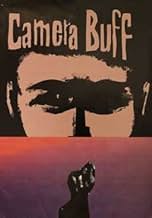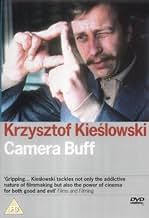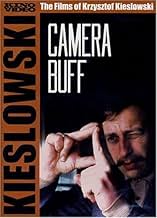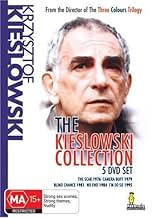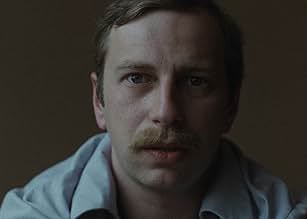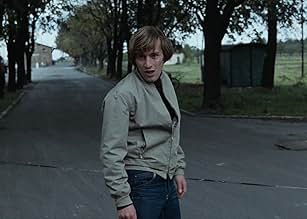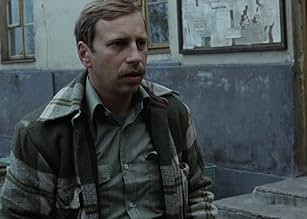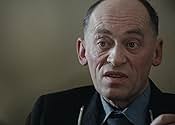CALIFICACIÓN DE IMDb
7.8/10
8.9 k
TU CALIFICACIÓN
Filip compra una cámara cuando nace su primer hijo. Como es el primero en la localidad en tener camara, es nombrado fotógrafo oficial.Filip compra una cámara cuando nace su primer hijo. Como es el primero en la localidad en tener camara, es nombrado fotógrafo oficial.Filip compra una cámara cuando nace su primer hijo. Como es el primero en la localidad en tener camara, es nombrado fotógrafo oficial.
- Dirección
- Guionistas
- Elenco
- Premios
- 6 premios ganados en total
Opiniones destacadas
A Model of the Man as a Young Artist
One of the best things in the world is to take someone you love deeply and trace them back in their histories, back back before you knew them. Back until you see all the butterflies that nudged each other to produce what you need and feed.
And before the shape was mature. Yes, then you can see the structure, the limbs before they flowered and even surprise yourself a bit.
I'm in love with Kieslowski. Oh he isn't my favorite filmmaker, and not the one I spend time with when I need to learn and grow. But he is someone to have tea with, a friend who has his own way of fluffing air with apparent lovely slight fogs but when you encounter them you find them informed, nourishing, psychotropic. More than lovely. "Heaven," though not all his, is something I wish on every soul and every vehicle he had driven until then carried him there.
This is Kielsowski's first feature. It was before he entered into that odd writing partnership where some external force (Piesiewicz) created some sort of conventional frame on which our artistlover could drape his folds, lace and knives. Before that clever partnership that hid the mechanics.
Here you can see his favored machine, the simple fold: a movie about movie-making and love, and all the related dimensions he knew at the time: intellectual, death, rutting, wistfulness, justice. Passions all. Urges all. At the end, it loops upon itself, the ladder complete to start again at the beginning of the next.
It isn't particularly profound or satisfying by itself. But if you are a lucid mind today, chances are you think about narrative flows and how you and the world use them to wind around and buffet each other. And almost certainly you have had tea with Kieslowski.
If so, you'll find this model of his younger self will tell you something about yourself in an odd, indirectly magical way. If you do, check out the trigger for passion here: Chopin.
Ted's Evaluation -- 3 of 3: Worth watching.
One of the best things in the world is to take someone you love deeply and trace them back in their histories, back back before you knew them. Back until you see all the butterflies that nudged each other to produce what you need and feed.
And before the shape was mature. Yes, then you can see the structure, the limbs before they flowered and even surprise yourself a bit.
I'm in love with Kieslowski. Oh he isn't my favorite filmmaker, and not the one I spend time with when I need to learn and grow. But he is someone to have tea with, a friend who has his own way of fluffing air with apparent lovely slight fogs but when you encounter them you find them informed, nourishing, psychotropic. More than lovely. "Heaven," though not all his, is something I wish on every soul and every vehicle he had driven until then carried him there.
This is Kielsowski's first feature. It was before he entered into that odd writing partnership where some external force (Piesiewicz) created some sort of conventional frame on which our artistlover could drape his folds, lace and knives. Before that clever partnership that hid the mechanics.
Here you can see his favored machine, the simple fold: a movie about movie-making and love, and all the related dimensions he knew at the time: intellectual, death, rutting, wistfulness, justice. Passions all. Urges all. At the end, it loops upon itself, the ladder complete to start again at the beginning of the next.
It isn't particularly profound or satisfying by itself. But if you are a lucid mind today, chances are you think about narrative flows and how you and the world use them to wind around and buffet each other. And almost certainly you have had tea with Kieslowski.
If so, you'll find this model of his younger self will tell you something about yourself in an odd, indirectly magical way. If you do, check out the trigger for passion here: Chopin.
Ted's Evaluation -- 3 of 3: Worth watching.
Haven't seen every Kieslowski work yet (though as of now it's close), but of what has been seen all ranges between very good (the 8th episode of 'Dekalog') to masterpiece ('Three Colors: Red' and 'Blue' and the whole 'Dekalog' series). To me, he was an immensely gifted director, who died far too early.
An early effort, 'Camera Buff' is not among Kieslowski's best work, but generally it is deserving of more love. Although Kieslowski's directing style is fairly well established, remarkable for so early on, it did become more refined later on as seen with his late 80s-early 90s work. There is a preference for the more intricate-sounding music scores of his later work, this score was the kind that worked well within the film but one doesn't have the desire to hear it on its own repeatedly, and the slightly more emotional resonant and intense work like the best of the 'Dekalog' series, 'The Double Life of Veronique' and 'Three Colors: Red' and 'Blue'.
Despite how that sounds, there's actually not much wrong at all with 'Camera Buff', just that it was done better later. This said, 'Camera Buff' is a great film, regardless of what stage it was made in Kieslowski's career.
'Camera Buff', as was always the case in Kieslowski's work, is very well made. The cinematography is minimalist, but visually striking and atmospheric as well as fascinatingly personal. As well as being beautifully shot with atmospheric use of colour to match the mood, it is gritty yet beautiful with many thoughtful and emotionally powerful images lingering long into the memory. Kieslowski's direction is quietly unobtrusive, intelligently paced and never too heavy.
It's a thought-provoking film in writing, as ever thematically rich and with complex characters, the shift from initial comedy to drama expertly done rather than abrupt and jarring. Kieslowski again proves himself as a master of narrative construction, and the whole film is thoroughly engaging and suitably challenging. The acting is as always from Kieslowski marvellously nuanced and natural.
To conclude, early Kieslowski that while not one of his best is deserving of more love. 9/10 Bethany Cox
An early effort, 'Camera Buff' is not among Kieslowski's best work, but generally it is deserving of more love. Although Kieslowski's directing style is fairly well established, remarkable for so early on, it did become more refined later on as seen with his late 80s-early 90s work. There is a preference for the more intricate-sounding music scores of his later work, this score was the kind that worked well within the film but one doesn't have the desire to hear it on its own repeatedly, and the slightly more emotional resonant and intense work like the best of the 'Dekalog' series, 'The Double Life of Veronique' and 'Three Colors: Red' and 'Blue'.
Despite how that sounds, there's actually not much wrong at all with 'Camera Buff', just that it was done better later. This said, 'Camera Buff' is a great film, regardless of what stage it was made in Kieslowski's career.
'Camera Buff', as was always the case in Kieslowski's work, is very well made. The cinematography is minimalist, but visually striking and atmospheric as well as fascinatingly personal. As well as being beautifully shot with atmospheric use of colour to match the mood, it is gritty yet beautiful with many thoughtful and emotionally powerful images lingering long into the memory. Kieslowski's direction is quietly unobtrusive, intelligently paced and never too heavy.
It's a thought-provoking film in writing, as ever thematically rich and with complex characters, the shift from initial comedy to drama expertly done rather than abrupt and jarring. Kieslowski again proves himself as a master of narrative construction, and the whole film is thoroughly engaging and suitably challenging. The acting is as always from Kieslowski marvellously nuanced and natural.
To conclude, early Kieslowski that while not one of his best is deserving of more love. 9/10 Bethany Cox
Krzyszof Kieslowksi begun his career as a documentary film-maker. From the start, he seemed to know two things: that in the shabby, feudal bureaucracy that was communist Poland, everything was political; and that the camera is never truly neutral. It was the second concern that saw him shift into telling fictional, constructed stories; while the first, and his own struggles as a young director, inspired the subject of 'Camera Buff', his first feature. As well as its immediate subject, the film is also a fascinating portrayal of an unfashionable subject, namely the class system, alive and well in the supposed socialist utopia (Kieslowski was a great admirer of Ken Loach, so perhaps we should not be too surprised). The film starts as a black comedy in the manner of the tenth part of his later 'Dekalog', and is both very funny and immediately true to life; as it progresses, it becomes more serious but there isn't quite the emotional intensity that marks his greatest works. The score is also less remarkable than those in the films he made with Zbigniew Priesner, his permanent collaborator from the mid 1980s. But his skill at composing images that are simultaneously profoundly ordinary and starkly arresting is very much in evidence, as is the characteristic sense of an all-pervasive greyness in the lives of his characters, punctured only by shafts of colour when his hapless hero comes into contact with the affluent metropolitan elite. In Dennis Potter's 'The Singing Detective', a central theme is the way that the artist will stop at nothing in using their own life as material, and this is also a theme here, growing in importance as the movie progresses. It's an unusual subject for a debut, and can perhaps be seen as Kieslowski laying his cards on the table before he begun the game. Greatness lay just around the corner.
I really liked this film because it dared to be different and it was an excellent study of psychology. This movie was about a Polish man who scraped together his money in order to by an 8mm camera to film his new baby. However, shortly after getting the camera and beginning filming his wife and child, he gets really hooked on making his little films--and seems to film almost everything around him. At first, it's fun, but then it becomes an obsession. In the process, instead of LIVING and EXPERIENCING life with his little family, he is filming them in a very detached way. However, he is so into the filming that he hardly recognizes his wife's growing anger over that ^&@#*^@! camera! Then, when his boss sees him filming and asks him to make a film for the company, his problem grows by leaps and bounds. He seems to see himself as the next great documentary maker and begins to enter competitions and send his films to the television network. To his wife's chagrin, he receives positive reviews and by this point she's lost him--they have no real life together. Where the film goes from there I will leave for you to watch. It is a fascinating psychological study of a man and his obsession--as well as the impact this ultimately has on others around him. An excellent film.
There are times in our lives that a minor event becomes a biggest event, something that change your life for good or bad, but it's something that makes what you are and defines your whole journey through life. To me this thing was movies. Since I was kid I watched movies but I didn't have a greater perception of what movies were and their meaning, all I know is that I liked for some reason. When I grow older I noticed that is something very important to me and it was something that I couldn't live without, to remember good cinematic moments and to see a different look through our reality, to have different and pleasant experiences.
Since I'm talking about movies and turning points in someone's life, Krzysztof Kieslowski's "Amator" is a brilliant and deep look into the life of a man who accidentally became a filmmaker. Here, Filip Mosz (Jerzy Stuhr) is a happy man that awaits the birth of his first child and he buys a camera to film the event. After that he realizes that he created a magical world through what he filmed, he notices that everything is different, beautiful behind the lens of a camera and starts to make simple documentaries, filming his friends, his neighborhood and everything he finds interesting to film.
But one day someone told to his boss that he has a camera and he needs the camera because the Comunist Party wants to film a celebration of a great event in the town. Since Filip is a State civil servant (working in a factory) he's almost forced to film the event (he's the only person in the whole city to have a 8mm camera). What is interesting here is that Filip enjoyed filming the celebration, doing a great job that caught the attention of his bosses and his friends and that led his film to be registered into a film festival for amateur filmmakers. Filip sudden success makes him moving forward in the making of all sorts of documentaries, one of this documentaries features an midget hard working colleague of Filip in the leading role, something that his bosses doesn't want to be filmed, after all Filip's films are sponsored by the Comunist Party and they don't want to get involved with supposed controversial subjects. Here starts Filip's problems, because now he has a conscience about the power of movies, the influence that his documentaries has in people's lives, in the government, and what it's images may cause to his family and his friends. Is it possible that people can respect and accept what you do even if what you do it's something that pushes away from all the people you love and care? Is Filip a responsible filmmaker or he's just pretending to be someone he's not to get attention? What is best: to be truthful to yourself and lie to others to have good relations or be truthful to everyone and be hated for it? Many questions to be answered by the viewers in this exciting and wonderful film.
Kieslowski knows exactly what's he doing here. This story hands perfectly well to him not only because he's a great artist that deal with many obstacles to make his movies. No, he started filming documentaries,pretty much in what Filip does, filming for the Comunist Party in Poland. In one of the documentaries he accidentally filmed an killing, then his bosses were told and started to control all of his films since then. His first films were censored during the 1970's and beginning of 1980's so in "Amator" we know what he's saying about the control of what filmmakers can do or not. If you are familiar with his first films you can notice that in almost all of it he criticizes the government in one way or another, his attacks are very sharp, very subtle in films like "Bez Konca". With the Trilogy of Colors, "A Short Film About Love" and the "Dekalog" you'll see that he's a more artistic creator. But as in all of his films he's got the partnership of the writer Krzysztof Piesiwicz, a great collaborator.
The acting here is great: Jerzy Sthur in the leading role is awesome. His quietness and strange manners put him in the same type of a Carlitos the Chaplin character, sometimes he's funny, other times he's very impulsive. Malgorzata Zabkowska plays Filip's conflicted wife, a woman that wants the attention of his husband that seems to care more about his movies than to health of his child. In the role of Witek, Filip's best friend and supporter, Tadeusz Bradecki gives a very good performance, showing the limits of what a man can do to a friend and what he won't do. When the movie becomes too slow and sometimes depressive Witek appears to show a little bit of humor.
Another great and reflective work from the fantastic director Kryzsztof Kieslowski, a must see film for those who admires his films, and for those who love movies as I do. 10/10
Since I'm talking about movies and turning points in someone's life, Krzysztof Kieslowski's "Amator" is a brilliant and deep look into the life of a man who accidentally became a filmmaker. Here, Filip Mosz (Jerzy Stuhr) is a happy man that awaits the birth of his first child and he buys a camera to film the event. After that he realizes that he created a magical world through what he filmed, he notices that everything is different, beautiful behind the lens of a camera and starts to make simple documentaries, filming his friends, his neighborhood and everything he finds interesting to film.
But one day someone told to his boss that he has a camera and he needs the camera because the Comunist Party wants to film a celebration of a great event in the town. Since Filip is a State civil servant (working in a factory) he's almost forced to film the event (he's the only person in the whole city to have a 8mm camera). What is interesting here is that Filip enjoyed filming the celebration, doing a great job that caught the attention of his bosses and his friends and that led his film to be registered into a film festival for amateur filmmakers. Filip sudden success makes him moving forward in the making of all sorts of documentaries, one of this documentaries features an midget hard working colleague of Filip in the leading role, something that his bosses doesn't want to be filmed, after all Filip's films are sponsored by the Comunist Party and they don't want to get involved with supposed controversial subjects. Here starts Filip's problems, because now he has a conscience about the power of movies, the influence that his documentaries has in people's lives, in the government, and what it's images may cause to his family and his friends. Is it possible that people can respect and accept what you do even if what you do it's something that pushes away from all the people you love and care? Is Filip a responsible filmmaker or he's just pretending to be someone he's not to get attention? What is best: to be truthful to yourself and lie to others to have good relations or be truthful to everyone and be hated for it? Many questions to be answered by the viewers in this exciting and wonderful film.
Kieslowski knows exactly what's he doing here. This story hands perfectly well to him not only because he's a great artist that deal with many obstacles to make his movies. No, he started filming documentaries,pretty much in what Filip does, filming for the Comunist Party in Poland. In one of the documentaries he accidentally filmed an killing, then his bosses were told and started to control all of his films since then. His first films were censored during the 1970's and beginning of 1980's so in "Amator" we know what he's saying about the control of what filmmakers can do or not. If you are familiar with his first films you can notice that in almost all of it he criticizes the government in one way or another, his attacks are very sharp, very subtle in films like "Bez Konca". With the Trilogy of Colors, "A Short Film About Love" and the "Dekalog" you'll see that he's a more artistic creator. But as in all of his films he's got the partnership of the writer Krzysztof Piesiwicz, a great collaborator.
The acting here is great: Jerzy Sthur in the leading role is awesome. His quietness and strange manners put him in the same type of a Carlitos the Chaplin character, sometimes he's funny, other times he's very impulsive. Malgorzata Zabkowska plays Filip's conflicted wife, a woman that wants the attention of his husband that seems to care more about his movies than to health of his child. In the role of Witek, Filip's best friend and supporter, Tadeusz Bradecki gives a very good performance, showing the limits of what a man can do to a friend and what he won't do. When the movie becomes too slow and sometimes depressive Witek appears to show a little bit of humor.
Another great and reflective work from the fantastic director Kryzsztof Kieslowski, a must see film for those who admires his films, and for those who love movies as I do. 10/10
¿Sabías que…?
- TriviaThe film's opening scene and Irka's nightmare about a hawk killing a chicken are reminiscent of Ken Loach's Kes (1969) -- a film about a boy who takes to training a wild kestrel in order to escape his troubled life. Later, Filip can be seen reading a filmmaking text and turning to a section about Ken Loach and Kes (1969). This reference is twofold. First, Filip is clearly inspired by filmmakers like Loach in making social realist films about working-class people. Second, Irka is tormented by images mirroring Kes (1969) which represent her husband's budding obsession with this type of filmmaking.
- Citas
Piotrek Krawczyk: [looking at a roll of motion picture film] It's beautiful what you guys do. A person's no longer alive, yet she's still here. It's beautiful.
- ConexionesFeatured in Fejezetek a film történetéböl: A lengyel film (1990)
Selecciones populares
Inicia sesión para calificar y agrega a la lista de videos para obtener recomendaciones personalizadas
- How long is Camera Buff?Con tecnología de Alexa
Detalles
Contribuir a esta página
Sugiere una edición o agrega el contenido que falta


